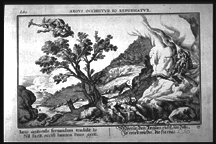

The Eyes of Argus transform'd into a Peacolks Train
Now Jove no longer cou'd her suff'rings bear;
But call'd in haste his airy messenger,
The son of Maia, with severe decree
To kill the keeper, and to set her free.
With all his harness soon the God was sped,
His flying hat was fastned on his head,
Wings on his heels were hung, and in his hand
He holds the vertue of the snaky wand.
The liquid air his moving pinions wound,
And, in the moment, shoot him on the ground.
Before he came in sight, the crafty God
His wings dismiss'd, but still retain'd his rod:
That sleep-procuring wand wise Hermes took,
But made it seem to sight a sherpherd's hook.
With this, he did a herd of goats controul;
Which by the way he met, and slily stole.
Clad like a country swain, he pip'd, and sung;
And playing, drove his jolly troop along.
With pleasure, Argus the musician heeds;
But wonders much at those new vocal reeds.
And whosoe'er thou art, my friend, said he,
Up hither drive thy goats, and play by me:
This hill has browz for them, and shade for thee.
The God, who was with ease induc'd to climb,
Began discourse to pass away the time;
And still betwixt, his tuneful pipe he plies;
And watch'd his hour, to close the keeper's eyes.
With much ado, he partly kept awake;
Not suff'ring all his eyes repose to take:
And ask'd the stranger, who did reeds invent,
And whence began so rare an instrument?
(Note: The story of Io is continued after the next section that describes the transformation of Syrinx into reeds.)